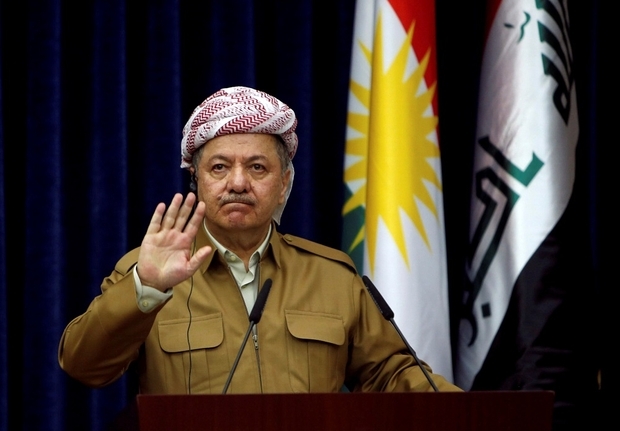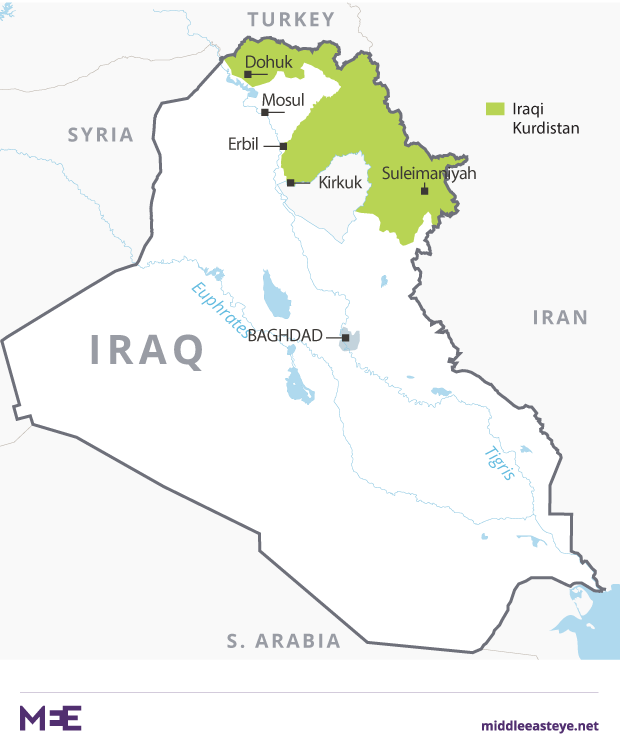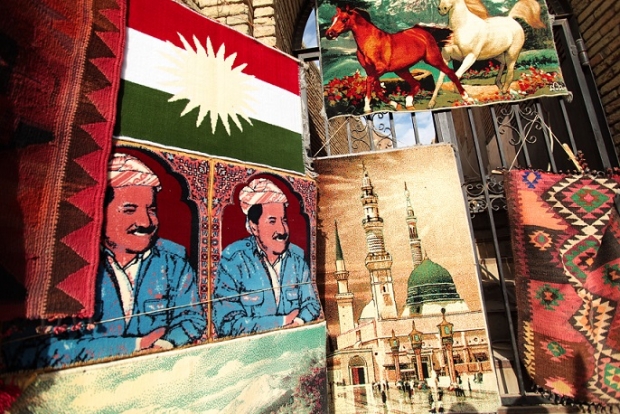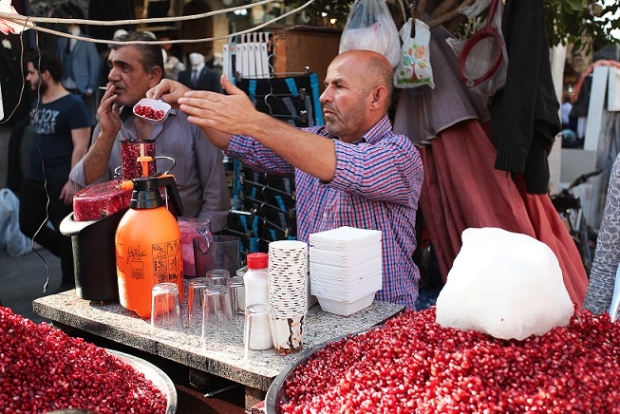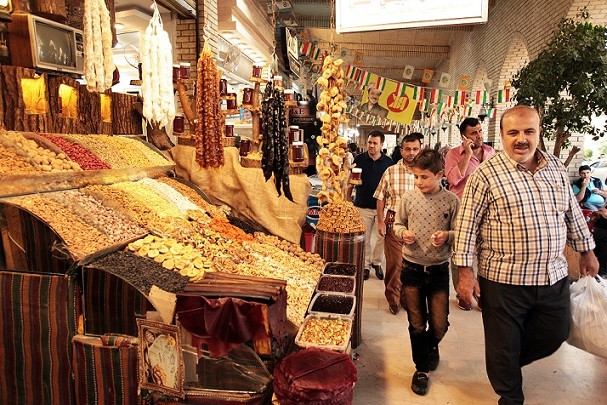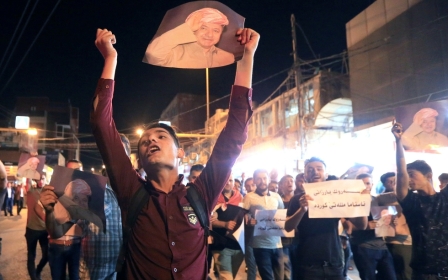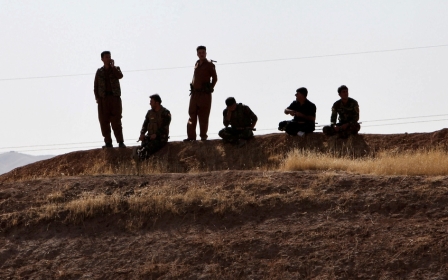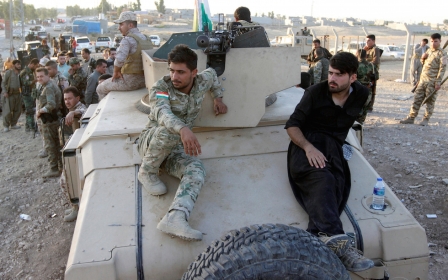'Now we're warring between ourselves': In Iraq, Kurdish turmoil turns inward
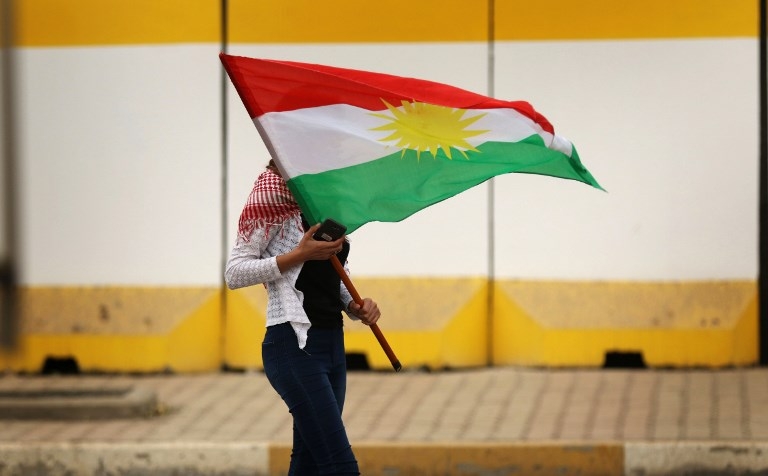
ERBIL - At around 8:30pm on 29 October, a group of thieves broke into the modest offices of Kurdish news channel NRT, smashing televisions and cameras, emptying the safe, and stealing computer hard disks.
“They took anything that they could profit from," bureau chief Kawa Abdulqadir told MEE in the dust and debris-strewn office, above a supermarket in an unassuming residential district of the city.
For 24 hours afterwards, the office was guarded by the Asayish, Kurdish intelligence officers.
The culprits have not yet been arrested, but Abdulqadir believes they were supporters of Massoud Barzani, who announced he would step down as president of Iraqi Kurdistan on the night of the attack
“We were targeted. We are a local, an independent, and a free journalism, and affect the Kurdish people," Abdulqadir told MEE.
“We don’t publish against Barzani – we publish about the political situation in Kurdistan. NRT speech is critical and against corruption. They [the attackers] want to kill free opinion in Kurdistan.”
Brink of chaos
Long seen as the most stable part of Iraq, the semi-autonomous Kurdistan region has been tilting on the brink of chaos following a popular but arguably overly ambitious independence referendum on 25 September.
Since then, federal Iraqi authorities in Baghdad have closed Iraqi Kurdistan’s two airports to international traffic, pushed for control of land borders with Iran, Turkey and Syria, and taken back swathes of land held by the Kurds since they pushed back the Islamic State (IS) group's advances in 2014.
The former president of Iraqi Kurdistan hugely overestimated the foreign support he would receive for the independence vote: the US, in particular, said it was “deeply disappointed” by the decision to hold the referendum, while it commended Barzani’s decision not to seek an extra term as leader.
As lawmakers met in Erbil to approve Barzani’s resignation on the same day as his announcement, protests outside the parliament building turned violent, with attackers reportedly wielding knives and sticks.
In addition to independent journalists and the seat of parliament, Kurdish political parties less enthusiastic about Barzani’s brazen attempt at independence have also come under attack.
Offices of the Patriotic Union of Kurdistan (PUK) party and the Gorran Movement - the other main players in Iraqi Kurdistan’s coalition government - were set on fire on 29 October in the town of Zakho, in Dohuk province.
Party activists believe they were targeted because they oppose Barzani’s omnipotence and the extension of his term as leader. A two-year extension expired in August 2015 but since then, politicians have been unable to agree on a successor and Barzani has remained in office.“It is not personal, but we as Gorran, we are against the extension of Barzani’s term - we think he must be elected by the law, by the people,” Shorsh Haji, member of the Gorran Movement's executive committee, told MEE.
According to Haji, KDP followers surrounded Gorran Movement headquarters in Erbil, Dohuk and Soran, and carried out an arson attack on the Zakho office.
The KDP apologised to PUK but not to us, and that sends a message to encourage KDP supporters and thugs to attack the Gorran Movement
- Shorsh Haji, Gorran Movement executive committee member
He claimed that the KDP apologised to the PUK for attacks on their property, but remained silent about violence against the Gorran Movement. “The KDP apologised to PUK but not to us, and that sends a message to encourage KDP supporters and thugs to attack the Gorran Movement.”
The situation in Erbil had returned to normal the following day when MEE visited the parliament building. Bar a few cars honking noisily as they passed, the situation was calm with armed guards protecting the building as usual. A media source close to the PUK told MEE that nobody from the party was injured in the spate of violence.
Family feuds
Kurdish internecine tensions centre around the Barzani clan and its Kurdistan Democratic Party, and the Patriotic Union of Kurdistan (PUK), led by the Talabani family. Both currently have significant shares of the Kurdistan coalition government, but the PUK is far closer to Baghdad: party veteran Fuad Masum is currently president of Iraq.
These mostly Shia militias are officially recognised alongside the Iraqi Army as part of the country’s security forces, but have been accused of looting, burning and terrorising local populations during recent assaults. Barzani said some Kurds were guilty of “national betrayal” by stabbing pro-independence voters with a "poisoned knife".
The PUK are widely believed to have struck a deal with Baghdad to retreat from Kirkuk. The division is often shaped as a divide between pro-Barzani Erbil and Sulaymaniyah, Iraqi Kurdistan’s second city and seat of the PUK.
The Talabani faction of the PUK took revenge by doing what Barzani did to them in 1996: calling in the help of Baghdad's military might
- Joost Hiltermann, MENA programme director at Crisis Group
Barzani exploited the impossibility of opposing an independence referendum in Iraqi Kurdistan in order to solidify his rule, having extended his presidency twice without elections, according to Joost Hiltermann, MENA programme director at Crisis Group, a Brussels-based anti-conflict and policy organisation.
“But he miscalculated. The Talabani faction of the PUK took revenge by doing what Barzani did to them in 1996: calling in the help of Baghdad's military might," Hiltermann told MEE, referring to a moment in the Iraqi Kurdish civil war when Barzani asked Saddam Hussein’s troops for help fighting the PUK. “Obviously, this has done little to help calm the internal front.”
'Warring between ourselves'
Intra-Kurdish rivalries are no secret to the Kurdistan region’s 5.2 million citizens.
“Some parties in Sulaymaniyah think as Baghdad think about the way Kurdistan should be governed," added Abdulqadir from NRT, referring to the PUK’s HQ city. “Other parties like the Kurdistan Democratic Party are against that. There is a strong relationship between some officials in Sulaymaniyah and the Federal Government. Parties in Erbil are against them.”
The intra-Kurdish rivalries might be evident, but that does not stop them being problematic.
“Before we had an enemy: Daesh - and now we’re warring between ourselves between the government of Iraq and the government of the Kurdistan region," Ayad Ismail Mohammed, a lawyer supporting NRT after the attack on their office, told MEE.
“This is a danger to all our lives, especially these gatherings that happen in cities. It’s dangerous for journalists or political parties.”
In Erbil, where the KDP enjoys strong support, blame for the post-referendum turmoil lies more with Baghdad and foreign allies such as Iran, than with the Kurds’ internal differences.
Abu Aram, a pomegranate seller next to Erbil Citadel, told MEE that he felt “joy” at voting yes in the independence referendum, but that the Kurds felt let down by the international community, as well as Turkey and Iran.
This is a narrative that analysts say the KDP has hammed up, in order to mask intra-Kurdish rivalries, and, more significantly, divides within the party. It was particularly Massoud Barzani’s wing of the KDP that pushed for the independence referendum, knowing that few Kurds could or would oppose it publicly.
Failed but independent?
The Kurds’ internecine conflicts only add to the existing schism between Kurdistan and federal Iraq. However, the collapse of the little unity they have had might not hinder independence altogether: it would more be the case that it would prevent a stable version of it.
“A people can attain statehood regardless of internal problems – see South Sudan," explained Hiltermann. “You might end up with a failed state, but it would still be independent.”
The more salient issue is that neither Iran nor Turkey would allow the Kurds independence, and might increasingly exploit intra-Kurdish rivalries for greater power and influence in northern Iraq.
“Kurds should not lean towards either side simply because two families [the Barzanis and the Talabanis] are not getting along," Diliman Abdulkader, a Kurdish analyst, who also works as a columnist for the targeted news channel NRT, told MEE.
“If both the KDP and PUK truly have the Kurdish nation in mind, they would not split Erbil and Sulaymaniyah. This will be a dangerous mistake. It will be against Kurdish interests, US interests and will only service Iran, Iraq, and Turkey’s goals.”
This is what we say as independent journalists: we try to expand democracy in Kurdistan, but unfortunately, the parties and the leaders are not with freedom
- Kawa Abdulqadir, NRT director in Erbil
It is impossible to say what will result from tensions between and within Kurdish political parties. According to Hiltermann from Crisis Group: “Tensions are likely to endure, unless the Masoud/Masrour Barzani line relaxes its control and allows its rivals (within the KDP, as well as the PUK, Gorran, the Islamists, and any new parties as may emerge) to fully participate in decision-making.”
As for Kurdish journalists, they want to see a reality that affords them greater protection, unhopeful that it will come from divided Kurdish authorities with other priorities.
“The international community should press on the Kurdish government, to save media freedom and democracy, and to hold elections periodically,” said Kawa Abdulqadir, the NRT director in Erbil.
“This is what we say as independent journalists: we try to expand democracy in Kurdistan, but unfortunately, the parties and the leaders are not with freedom. It is against their interests.”
New MEE newsletter: Jerusalem Dispatch
Sign up to get the latest insights and analysis on Israel-Palestine, alongside Turkey Unpacked and other MEE newsletters
Middle East Eye delivers independent and unrivalled coverage and analysis of the Middle East, North Africa and beyond. To learn more about republishing this content and the associated fees, please fill out this form. More about MEE can be found here.


